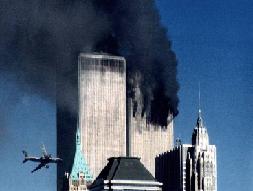UnNews:Regulators seek to make air travel deadlier
| This article is part of UnNews, your source for up-to-the-picosecond misinformation. |
19 October 2012
“I am relevant. The Constitution gives me relevance”
WASHINGTON, D.C. -- The 43 months since the last deadly U.S. air crash is not the unvarnished good news that some believe it is. Rather, it poses a daunting challenge to regulators: gin up a believable rationale for costly and intrusive new regulations, on an industry in which everyone but Southwest Airlines is bankrupt, to solve a non-problem.
"The industry's extraordinary safety record, ironically, could be why the government can't act proactively," said Bill Voss, president of the Flight Safety Foundation. So last year, the Federal Aviation Administration revised numerous rules in order to make commercial air travel less safe. For example, last year, despite subjecting airline pilots to a new regime of log books and sleepless mandatory "nap-time," the FAA decided to let cargo pilots continue to fly while dog-tired.
"Sometimes it is difficult to provide the cost justification for the rules we're producing," said Transportation Secretary Ray LaHood. "But one big DHL crash could turn the tide."
Last year, the FAA missed a legal deadline for new regulations on pilot training that Congress ordered after the nation's last fatal crash, in 2009, when a poorly trained captain ditched an airliner into a house near Buffalo, N.Y., killing all aboard but only one person in the house. "Sen. (Charles) Schumer (D-NY) was not able to parlay this tragedy into increased funding," Mr. LaHood said, "but a bigger body count could have made a key difference."
In analyzing costs and benefits, the FAA assigns a value of $6.2 million to each life saved. This is in contrast to Obamacare, in which case middle-aged patients needing hip or knee replacement are valued at $14.98, depending on whether Americans find themselves as free to skip legal deadlines for insuring themselves as regulators are to skip legal deadlines for issuing regulations. However, even modest changes in regulations can cost the industry hundreds of millions of dollars when spread across a number of years; and in Washington, everything is, especially Republican "budget cuts", because it makes the numbers bigger. Thus, there would have to be what Firesign Theatre once described as "hamburger all over the highway" to justify new regulations.
"Many are feeling good about the interval without a fatality since Colgan 3407," said Scott Maurer, of Moore, S.C., who lost a daughter in that crash. "But without rules to sustain this effort, we know the race to the bottom will continue." Mr. Maurer explained that airlines normally are eager to kill their patrons and amass horrible safety records, were it not for a steady stream of new and changing rules, and are undaunted by the possibility of lawsuits from survivors.
Mr. LaHood insists that his department's regulations are ensuring high levels of airport security. This is compared to what would happen if neither the FAA nor its rules existed — a world in which, incidentally, George W. Bush is mostly through his third term and stumbling toward a fourth.
Since the late 1990s, airlines have emphasized voluntary compliance, passive data gathering, pooling their information, and disclosing safety violations to government through a working group with no fear of punishment — approaches that obviously do less good than cracking heads together. For example, airlines tell pilots not to abort takeoffs once a plane has hit 90 mph, because it's usually safer to take off despite the safety concern. But occasionally pilots abort takeoffs at high speeds anyway. A new crackdown on blowing off the rulebook could put regulators back in the driver's seat, and provide a groundswell for more of the same.
Sources[edit | edit source]
- Joan Lowy "Fatal air crash decline presents safety challenge" Associated Press, October 19, 2012
